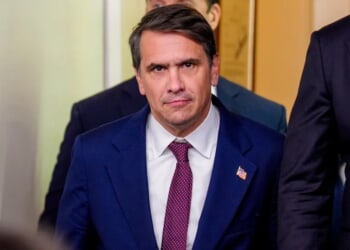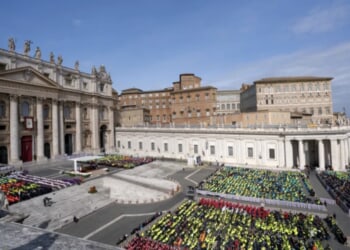Lord Ashcroft KCMG PC is an international businessman, philanthropist, author and pollster. For more information on his work, visit lordashcroft.com
Donald Trump had a busy last week.
On Monday, he held peace meetings in Israel and Egypt, bringing the war in Gaza to a temporary standstill, which we all hope will turn into a lasting peace. By Friday, he welcomed Ukrainian President Volodymyr Zelenskyy to the White House.
There has been a resounding sense of relief in Ukraine, when the news of the ceasefire reached between Israel and Hamas broke. When the Gaza war erupted barely a year and a half into Russia’s invasion, it diverted global attention – and crucially the US military support – away from Ukraine to the Middle East.
Now with Gaza relatively quiet Kyiv hopes the West will refocus on the existential war in Europe.
Yet, at this stage of the conflict, attention alone is not enough. Nearly four years int o Russia’s brutal invasion the human and economic toll on Ukraine is immense. The coming winter threatens to be particularly harsh as Russia once again targets Ukraine’s critical infrastructure and thermal power plants. The despicable nature of Moscow’s war strategy remains consistent: if you are not strong enough to win on the battlefield – target the civilians.
To mitigate the effects of these attacks, President Zelenskyy and his team held meetings in Washington with American energy companies, seeking help to keep Ukrainians warm. Discussions also took place with US defence firms that produce Tomahawks– long-range cruise missiles capable of striking targets up to 2500 km range. It is clear why Ukraine seeks such capabilities – to continue striking Russian oil facilities, military warehouses and weapons factories.
With Western sanctions failing to fully choke off Russia’s energy revenues, Ukraine, traditionally, has taken matters into its own hands. Over the past year alone, Kyiv has managed to cut Russian oil revenues by estimated 20 per cent, directly undermining the Kremlin’s ability to finance its war machine. This success has been largely driven by Ukraine’s ingenuity – particularly in the production of domestically developed long-range drones. During a visit to one of their secret production sites earlier this year, I saw firsthand the remarkable innovation powering this effort. Since then, Ukraine has announced a suite of new unmanned systems, positioning itself as a global leader in drone warfare technology.
Still, as Zelenskyy noted in Washington, advanced drones are not enough. Ukraine needs a mix of modern defence tech and traditional heavy weaponry – including the Tomahawk missiles. That was the key message of Friday’s talk at the White House, and one that presumably prompted Vladimir Putin to request an urgent phone call with Donald Trump just a day earlier.
On Thursday, plans were being laid for another Trump-Putin meeting – this time in Hungary’s capital Budapest, and notably without Zelenskyy’s participation. The choice of the location has unsettled European establishment and underscored a deeper truth: despite its rhetoric, Europe’s agency in this war is minimal. Once again, it is Washington and specifically Donald Trump who appears to be the decision-maker on the continent.
The relevance of the UK now sadly looks even less pertinent than that of Europe. Previous Conservative governments made a lot of mistakes, but they were steadfast on Ukraine. Over a year into a Labour government, Britain’s international relevance seems to be slipping. The so-called “Coalition of the Willing”, once envisioned as a UK-led initiative to support Kyiv, has yielded few tangible results – other than a decision to locate its headquarters on Paris. France and Germany, meanwhile, are divided over the use of frozen Russian assets, while southern European nations are hesitant to increase defence spending.
Across Europe, unity is fracturing. Poland and the Baltics sound the alarm over recent Russian air incursions, while Spain still refuses to raise defence spending above 2 per cent of GDP despite NATO’s renewed requirement.
So who will stand with Ukraine ‘for as long as it takes’ – the phrase that has come to symbolise Western impotence as much as solidarity? Increasingly, the answer seems to be Ukraine itself. Kyiv is building its own leverage, developing cutting-edge defence capabilities, and offering them as strategic assets. In Washington, Zelenskyy proposed a trade of sorts: in exchange for long-range American missiles, Ukraine would provide the US with modern defence technologies and “thousands of drones”.
However, early reports suggest the offer may not succeed. This is underscored by revelations of a heated Trump-Zelenskyy “screaming match”, during which the former reportedly warned Ukraine would be “destroyed” if it refused to yield to Putin’s demands. The exchange appears especially perplexing given that only weeks earlier Trump had asserted that Ukraine could still reclaim all territory seized by Russia. It now seems like the Tomahawk proposal was used as bait – to draw Putin to the table, rather than to arm Ukraine. If true, it would mirror the Biden administration’s own reluctance to provide Kyiv with decisive weaponry. Yet, Trump’s manoeuvre achieved its short-term aim – another round of talks with Putin.
Donald Trump has presented himself as a strong leader in the Middle East crisis – precisely what the world needed. He must now show the same resolve toward Moscow. The Kremlin respects only strength, and at present, Trump is the only global leader projecting it. In his next meeting with Putin, he must make it unambiguously clear: Russia must cease hostilities, agree to a ceasefire, and meet with Zelenskyy to negotiate a settlement.
As General Keith Kellogg told me recently, Ukraine may have to be patient about reclaiming all its territory. But if it plays the long game – preserving sovereignty, reforming its institutions and strengthening its partnerships – it can emerge as a resilient and prosperous European state.
Donald Trump now holds all the cards. If he plays them wisely – guided by instinct and not appeasement – he could not only secure the peace that Europe so desperately needs but also claim the Nobel Prize, he so clearly desires. More importantly, he could save hundreds of thousands of lives.










![Florida Officer Shot Twice in the Face During Service Call; Suspect Killed [WATCH]](https://www.right2024.com/wp-content/uploads/2025/12/Inmate-Escapes-Atlanta-Hospital-After-Suicide-Attempt-Steals-SUV-Handgun-350x250.jpg)






